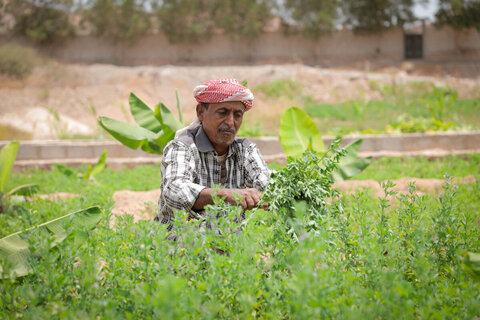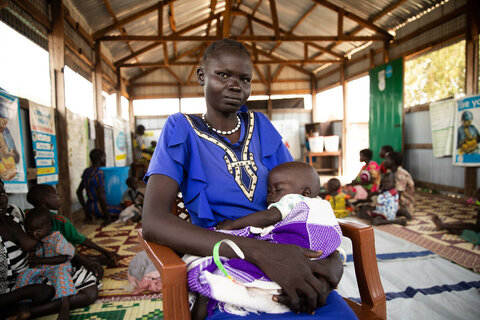Working to save and change lives
"Every time I arrive at a school to deliver food for school meals, I'm welcomed by children joyfully shouting ‘Porridge! Porridge! Porridge!" — Stanley, Driver, Malawi

"I have on more than three occasions slept on the road when my truck got stuck in the mud or when the roads were impassable due to poor conditions. But I'm always inspired every time I arrive at a school to deliver food for school meals. I'm welcomed by children joyfully shouting ‘Porridge! Porridge! Porridge!'
When I deliver food or nutrition supplements to hospitals, I see a sigh of relief from staff and patients. This motivates me to work hard. I feel useful and proud of helping people in need.
I got my truck stuck four times today. It rained yesterday and it is very slippery, but with my colleagues we are helping each other. We know some people are waiting for us and this gives us the strength to continue.
My wife and children understand the nature of my work so they know that if I come late, after dark, it is because I'm having a hard time in the field. They have learnt to live with this."
"Trying to be human in the face of profound inhumanity has been the hardest challenge." — Marwa, Communications Officer, Syria

"Trying to be human in the face of profound inhumanity has been the hardest challenge. When I talk to the victims and learn about their struggles, their loss, and their undying hope, I feel emotions that any human would feel: anger, incredulity, despair. I have learned through experience in areas of active conflict that it is these emotions that keep us human and allow us to relate to those we are trying to help. It humbles me, because I recognize, strongly, that I could have been in the shoes of these parents, children, siblings and spouses if not for accidental luck of the draw we call birth. I try to capture this feeling in all of my stories so that our readers can see themselves in the people whose stories we are sharing, and perhaps feel motivated to help by donating to support their basic life necessities.
I will never forget entering Douma on 15 March this year, the day that marked the start of the Syrian uprising seven long years ago. Everyone inside the besieged city — young and old — was begging me and other colleagues to take them out. Food was the last thing on their mind: escape was what they wanted. No words of comfort would soothe the people stuck inside Douma and it broke my heart to see the limits of our humanitarian mission.
It also pains me to see our common heritage destroyed and in ruins. Visiting cities across Syria that used to be major business hubs yet seeing them destroyed is heart breaking because with their loss went peoples' homes, livelihoods and histories."
"I can put myself in the shoes of the refugees because of what I have seeen." — Liberée, Monitoring Officer, Rwanda

"I used to have a big family: parents, siblings, grandparents and cousins. Many of them died during the genocide. I saw with my own eyes how my parents and brothers got killed in front of me. Coming back from that has not been easy for my sisters and me.
Now things have changed. Today people are seeking refuge in Rwanda from the same countries we Rwandans escaped to 24 years ago. I can put myself in their shoes because of what I have seen. I have a deeper understanding of what they are going through, surviving in the camps. We can provide them with food and ensure that their basic needs are met. But life in the camps is still challenging and different from home.
I like helping people and working as a humanitarian — especially when I can solve a problem for someone to make their life a little bit easier. Since I was a child, I wanted to help people in need.
The memories from the genocide and all those people in need of help motivated me to work for WFP. Like most Rwandans, I got help from WFP and remember the high-energy biscuits that school children still receive today.''
"Having been a WFP beneficiary, it makes me feel good to help others." — Garang, Logistics Assistant, South Sudan

"It was in 1998 that I first came to hear of WFP and the UN. The civil war had intensified, my family and I had been displaced, food had become so scarce and famine was declared. There was no food. I saw people starving and I was still a young boy. That was a really terrible experience for me to see, people suffering, people starving… just by the roadside. I remember WFP used to send us cowpeas, beans and wheat, only by air, as at that time roads were inaccessible because of the rain.
I joined WFP South Sudan in 2014 as a Logistics Assistant. It makes me feel good to help other beneficiaries, getting cargo to the right locations and to get the appreciation afterwards.
One time we sent a team into the field and one of our drop zone coordinators called me and said that there was a problem in the field. He explained that people were suffering a lot, and asked that airdrops be delivered quickly so people would not starve.
When they told me that I just remembered what we used to face in those days. I met with the aviation team and insisted that we assist this location as soon as possible. This was done, and afterwards the local authorities on the ground asked the drop zone coordinator ‘Who is this person called Garang? Tell him thank you so much.' "
"My first priority is to listen to the people." — Daniela, Engineer, Bangladesh

"Being a woman engineer in the field is hard, because this sector is still very much a ‘man's world' and people assume that, as a woman, you don't have enough experience. And working in places where women are not even visible is tough.
As a woman, I feel I have empathy with the communities we work with and this makes a huge difference. When I arrive on the ground, my first priority is to listen to the people as well as to the contractors, to understand what they need, what they want and how we can work best together. Just today, I was sitting with the workers in the new logistics hub we are building in the Kutupalong mega camp. They brought me cold water and, through my translator, told me about their families and their children — this creates a connection.
My team is key to helping WFP deliver food and emergency supplies, and to support the communities in achieving long term sustainability, so they can feed themselves. I like that my work has a concrete impact. I am always working towards getting myself out of a job. Wherever I am, I make sure we are giving communities the capacity to improve their homes, livelihoods, build schools and help their children so that they won't need our support any longer."
Based on contributions by Alessandro Abbonizio, Marwa Awad, Jonathan Eng, Shelley Thakral and Francis Thawani.


